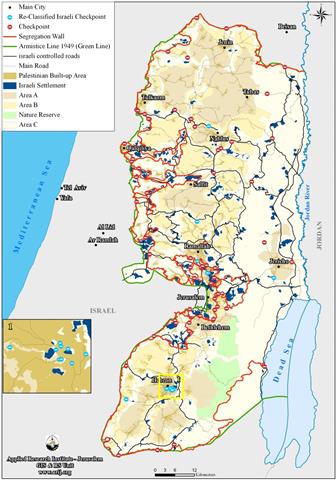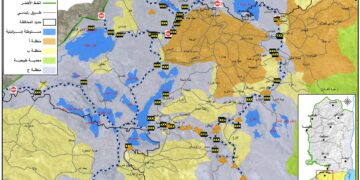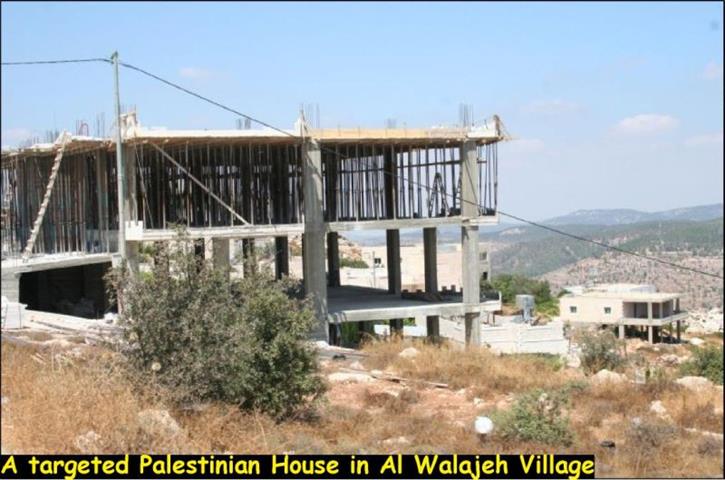It was recently reported that the Israeli Occupation Army had removed 15 checkpoints in the occupied West Bank in order to facilitate the movement of Palestinians throughout the territory; the most significant checkpoints were the DCO checkpoint at the entrance of Jericho city and Nablus checkpoint (Huwwara). The removal of the checkpoints was accompanied by a promotional campaign for Israel’s mission to ease restrictions on the movement of Palestinian citizens throughout the West Bank Territory.
The fact of the matter can be summarized that what Israel has done is just a political media game, as the checkpoints that Israel announced it would remove are still exist but their administrative classification was changed to what is known to Palestinians as flying or temporary checkpoints, with reference to their existence when needed, without having to erect a checkpoint on the road. This is usually related to the passage of Israeli settlers on the same road taken by Palestinians where the Israeli army re-activates the checkpoint and temporarily re-opens it. Similarly, the issue of the checkpoint is associated with the security situation as declared by the Israeli Occupation Army who re-sets the checkpoints on the roads in case of security alert. See Map 1
The Israeli Checkpoints in the Occupied Palestinian Territory
Israeli occupying forces operating in the West Bank and Gaza Strip have continued to impose significant restrictions at military checkpoints throughout the West Bank, Gaza Strip and East Jerusalem. The checkpoints are one component of a multi-faceted system of at least 669 checkpoints which include 17 temporary and flying checkpoints, 70 cement roadblocks, 234 earth mounds, 85 road gates, 113 gates in the Segregation Wall, as well as 71 observation towers, and 79 main checkpoints, (See Table 1). These checkpoints sever the connections between Palestinian cities, rural areas, and enclaves. As a result, Palestinians attempting to travel within the West Bank face extreme hardships. See Table 1
|
Table 1: Israeli Checkpoints in the Occupied West Bank Territory
|
|
Governorate
|
Checkpoint
|
Earth
mound
|
Observation Tower
|
Partial Checkpoint
|
Barrier Gate
|
Road Block
|
Road Gate
|
Total
|
|
Hebron
|
15
|
124
|
15
|
7
|
13
|
29
|
30
|
233
|
|
Bethlehem
|
8
|
10
|
11
|
2
|
8
|
2
|
6
|
47
|
|
Jerusalem
|
17
|
3
|
7
|
0
|
12
|
4
|
3
|
46
|
|
Ramallah
|
6
|
30
|
13
|
2
|
14
|
20
|
16
|
101
|
|
Jericho
|
4
|
4
|
0
|
2
|
0
|
0
|
0
|
10
|
|
Nablus
|
8
|
27
|
10
|
3
|
0
|
4
|
12
|
64
|
|
Salfit
|
3
|
11
|
3
|
0
|
4
|
9
|
8
|
38
|
|
Qalqilyah
|
6
|
5
|
3
|
1
|
23
|
2
|
2
|
42
|
|
Tulkarem
|
6
|
14
|
2
|
0
|
17
|
0
|
2
|
41
|
|
Jenin
|
4
|
6
|
7
|
0
|
21
|
0
|
4
|
42
|
|
Tubas
|
2
|
0
|
0
|
0
|
1
|
|
2
|
5
|
|
Total
|
79
|
234
|
71
|
17
|
113
|
70
|
85
|
669
|
Source: ARIJ GIS Database 2009
The Israeli occupation authorities have operated checkpoints in the OPT ever since Israel seized the territories in the 1967 War. However, in recent years, especially since the beginning of the second Intifada in September 2000, the Israeli government has significantly expanded the number of operational checkpoints. At the same time, Israeli occupying forces have begun to impose additional restrictions on Palestinian travel through the checkpoints. Israeli soldiers often humiliate or assault Palestinians at the checkpoints. In addition, many checkpoints remain inaccessible to Palestinians without permits issued by the Israeli occupying authorities and can be closed arbitrarily and without warning, leaving Palestinian travelers stranded on the roads. Thus, the checkpoints play a crucial role in fragmenting the land-mass of the OPT and supports Israel’s domination of the Palestinian population.
Some of the most concrete examples of Israel’s unique brand of apartheid policies are evident in the maintenance of the checkpoints and the Matrix of Control. The result is a unique system of discrimination that is planned meticulously by the Israeli government but implemented arbitrarily by Israeli occupying forces on the ground. These discriminatory policies violate principles of international humanitarian and human rights law and also harm the ability of the Palestinian population to support itself. In conjunction with Israeli closure policies, the checkpoints have certain acute affects on the ability of Palestinians to move freely, conduct business and access important goods and services, such as food, education and health services.
The Widespread abuse and harassment have been common features of Israeli checkpoints for many years. Palestinian civilians are often forced to wait long periods at checkpoints throughout the West Bank. The vast majority of checkpoints are not equipped with shelter and Palestinian civilians are often exposed to harsh weather for long hours. Summer heat and winter cold can have severe effects, especially on the very old and very young, and instances of heat stroke or pneumonia are not uncommon. Israeli soldiers often force Palestinians to wait for arbitrary reasons, or as a means of collective punishment.
Israeli occupying forces also often confiscate the ID cards of Palestinians traveling through checkpoints. Palestinians are required to carry these Israeli issued identification cards at all times. Palestinians are forced to wait at the checkpoint until their ID card is returned. ID must be presented at all checkpoints and if the card is not returned, Palestinians will be unable to travel out of the immediate area. In some instances, Israeli soldiers impound the card, creating significant and prolonged troubles for the targeted Palestinian.
Specific actions of Israeli soldiers at the checkpoints are often employed as a way of humiliating Palestinians crossing through the areas. For instance, lengthy and comprehensive searches are carried out arbitrarily. Palestinian civilians, especially young men, may also be temporarily detained without reason. Israeli soldiers regularly order Palestinians to perform ridiculous and unnecessary tasks before allowing them to pass. In addition, Israeli soldiers often verbally or psychologically abuse Palestinians crossing checkpoints. These methods, and others, are used to intimidate and humiliate Palestinians and enforce the unequal power dynamic between Israeli occupying forces and the occupied Palestinian population.
In addition to the humiliating verbal and psychological abuse, Israeli occupying forces at checkpoints frequently engage in direct physical abuse and assault against Palestinian civilians. Physical abuse ranges from the mistreatment of women during bodily searches to the shooting and killing of Palestinians. Reports of varying degrees of physical abuse are common.
Checkpoints in International Law
Israel’s checkpoints in the Occupied Palestinian Territories violate numerous United Nations Security Council and General Assembly Resolutions. In particular, theUN Security Council passed Resolution 242 following Israel’s seizure of the West Bank (including East Jerusalem), Gaza Strip and (Syrian) Golan Heights in the 1967 war. UNSCR Resolution 242 calls for ‘the withdrawal of all Israeli armed forces from the territories occupied’ in the 1967 war. Israel’s continued refusal to implement this resolution means that it now belligerently occupies the OPT. As an occupying power, Israel is also bound by international humanitarian and human rights laws.
International Human Rights Law
There is a wide array of international human rights principles which can be applied to the functioning of Israeli checkpoints in the Occupied Palestinian Territories. Israeli checkpoints violate the right to freedom of movement, the right to healthcare, the right to education, the right to religious freedom, the right to work, the right to food and water, the right to freedom from collective punishment, and other basic human rights. These rights are covered under various international treaties and covenants.
Freedom of Movement is protected by Article 12 of the International Covenant on Civil and Political Rights (ICCPR) which states: ”Everyone lawfully within the territory of a State shall, within that territory, have the right to liberty of movement and freedom to choose his residence.’
In the OPT, other rights are contingent upon freedom of movement and also protected in their own right. For instance, the right of access to healthcare is protected by Article 12 of the International Covenant on Economic, Social and Cultural Rights (ICESCR); the right to education is protected under Article 12 of the ICESCR and Article 26 of the Universal Declaration of Human Rights (UDHR); the right to freedom of religion is protected under Article 18 of the ICCPR; the right to work is protected under Article 6 of the ICESCR; the right to food and water is protected under Article 11 of the ICESCR and Article 26 of the UDHR; and other rights also fall under various aspects of human rights law. Israel’s checkpoints, however, seriously impede, hinder and often explicitly prevent the implementation of these rights and the provisions of the international human rights laws which protect them.
International Humanitarian Law
The system of Israeli checkpoints that severs the OPT also violates certain distinct principles of humanitarian law as codified in the Fourth Geneva Convention of 1949. Among the rights which checkpoints violate are:
the right to healthcare (Article 56),
the right to education (Article 50) and
the right to freedom of religion (Article 58). Article 3 of the Convention also strictly prohibits the occupying power from initiating ‘
violence to life and person‘ and ‘
outrages upon personal dignity, in particular humiliating and degrading treatment’.
The right to healthcare is a fundamental right guaranteed by a broad lexicon of both international humanitarian and human rights laws. In addition to Article 56 of the Fourth Geneva Convention, the First Additional Protocol to the Convention (1977) also contains significant protections for medical services and medical professionals
For instance, Article 15 of the Protocol states: ‘The Occupying Power shall afford civilian medical personnel in occupied territories every assistance to enable them to perform, to the best of their ability, their humanitarian functions.’ Israel’s checkpoints in the Occupied Palestinian Territories fail to guarantee this right of access, thus violating international law
Israel’s use of the checkpoints to enforce closure policies is a more direct and egregious violation of the Geneva Convention.
The closure policy has resulted in a humanitarian crisis throughout the OPT, particularly in the Gaza Strip, and violates Israel’s duty to ensure adequate food and medical supplies to the occupied Palestinian population (Article 55). Israeli occupying forces use the closure policy to restrict humanitarian relief shipments to Palestinian communities. Restrictions placed on humanitarian goods and supplies violate several articles of the Geneva Convention and the First Additional Protocol to the Convention
Article 70 of the Protocol states: ‘The Parties to the conflict and each High Contracting Party shall allow and facilitate rapid and unimpeded passage of all relief consignments, equipment and personnel provided in accordance with this Section, even if such assistance is destined for the civilian population of the adverse Party’ (Section 2).
The checkpoints and Israel’s closure policy are often used as a means of enforcing
collective punishment on the inhabitants of a certain area, or even the entire population of the OPT. The restrictions placed upon access to certain parts of the Gaza Strip or certain cities in the West Bank, such as Nablus, are clearly intended to target the civilian residents of the areas. The use of collective punishment is strictly forbidden by the Fourth Geneva Convention, Article 33 of which states: ”No protected person may be punished for an offence he or she has not personally committed. Collective penalties and likewise all measures of intimidation or of terrorism are prohibited. Reprisals against protected persons and their property are prohibited.”
Conclusion
Israel’s checkpoints in the Occupied Palestinian Territories comprise an affront to the human dignity of the Palestinian people and a serious and sustained violation of international law. In addition to violating numerous provisions of international human rights law, practices at the checkpoints are also blatant violations of international humanitarian law, specifically the Fourth Geneva Convention of 1949. These violations reflect a widespread and nuanced aspect of official Israeli government policy often applied in an arbitrary manner by Israeli occupying forces located at the checkpoints.
The use of closure by Israeli occupation authorities is a violation of fundamental principles of international humanitarian and human rights law. The Israeli closure policy, implemented by Israeli soldiers at checkpoints throughout the OPT, has seriously impeded the ability of Palestinian civilians to provide for their families and sustain themselves economically. In particular, the continued closure of the Gaza Strip has deepened the severe humanitarian crisis in the territory.
Israeli-imposed closures and the checkpoint system are crucial components of the
Matrix of Control constructed by Israeli occupation authorities in the Occupied Palestinian Territories
Along with illegal Israeli settlements, by-pass roads and at least 381 additional barriers, the checkpoints enforce the fragmentation of the OPT and the privileged position of Jewish Israeli settlers living in illegal Israeli settlements in the territories. The Matrix of Control allows Israeli occupation authorities to dominate and contain the Palestinian civilian population and their land while simultaneously serving the free access and high standard of living enjoyed by Israeli settlers. Palestinians face numerous hardships and human rights violations at Israeli checkpoints while Israeli settlers pass through easily and freely.
In addition to the numerous human rights violations outlined above, the system perpetrated by Israel’s checkpoints in the OPT comprises a crime of apartheid according to the
International Convention on the Suppression and Punishment of the Crime of Apartheid (1973). The Convention defines apartheid as: ‘the imposition of various legislative measures on different racial groups while injuring the rights of one.
Moreover, the crime of Apartheid comprises a ‘crime against humanity’ and ‘a serious threat to international peace and security.’
Therefore, implementation of the Convention requires that the checkpoints be immediately dismantled and members of the Israeli occupation authorities responsible for planning and implementing the checkpoint policy in the Occupied Palestinian Territories be tried in an international court.
::::::::::___
References:-
- [1] Jeff Halper. ‘The Key to Peace: Dismantling the Matrix of Control.’ The Israeli Committee against Home Demolitions, 2004 (www.icahd.org).
- [2] This right is also protected under Article 13 of the Universal Declaration of Human Rights.
- [3] The Fourth Geneva Convention, Article 3, Sections (a) and (c).
- [4] Articles 10, 15 and 16 each prohibit extensive restrictions on the access of medical personnel in occupied territories.
- [5] The right of access to healthcare is also protected by the International Covenant on Economic, Social and Cultural Rights (Article 12).
- [6] Specifically, Articles 59, 61, 62, 142 and 143 of the Geneva Convention and Articles 70, 71 and 81 of the First Additional Protocol.
- [7] For further analysis of Israeli travel restrictions in the OPT and international law, see the report: ‘Forbidden Roads: The Discriminatory Road Regime in the West Bank.’ B’Tselem, 2004 (www.btselem.org).
- [8] Halper, 2004.
- [9] The International Convention on the Suppression and Punishment of the Crime of Apartheid (1973), Article II, Sections (c) and (d). See also the Convention on the Elimination of Racial Discrimination, Articles 2, 3 and 5.
- [10] Ibid, Article 1.
Prepared by














